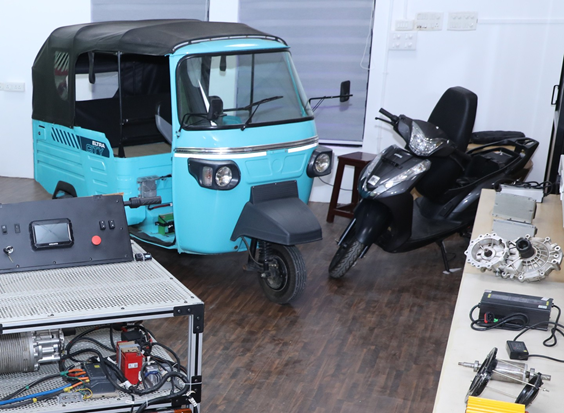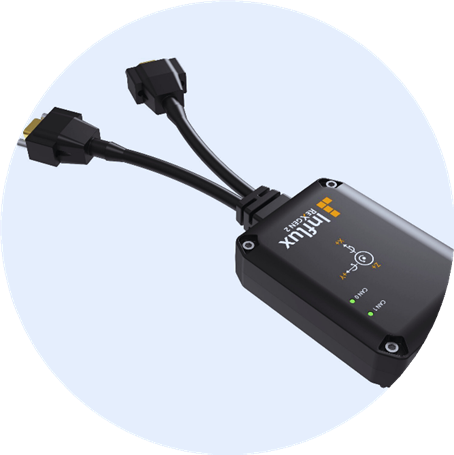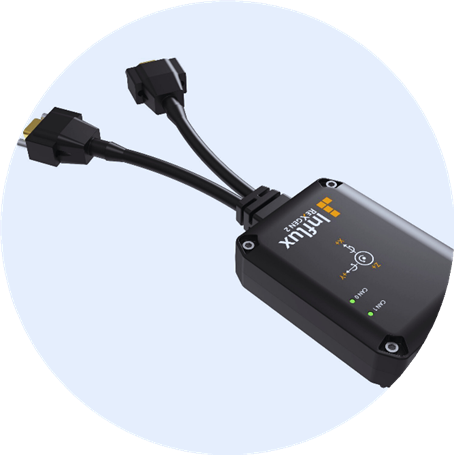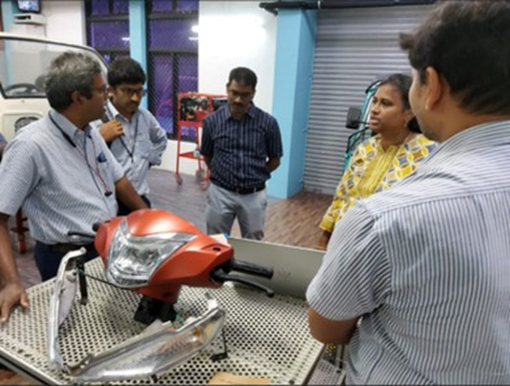E-Vehicle Engineering
Laboratory
E-Vehicle Engineering Laboratory


Electric Vehicle Drivetrain: Analyzing Powertrain Components
The electric vehicle drivetrain is central to understanding vehicle dynamics, energy efficiency, and overall performance. The lab offers a detailed exploration of key drivetrain components, including electric motors, battery systems, and controllers.
- Hands-on analysis of EV powertrains using electric two-wheelers, three-wheelers, and four-
- Motor performance testing under varying loads, speeds, and power demands, helping participants understand how the motor contributes to energy consumption and vehicle
- Gaining insights into the role of electric motors in determining overall vehicle efficiency and driving behavior.
- Exploring the interaction between motors and other drivetrain components, such as battery packs and controllers, to optimize energy transfer and maximize range.
Controller and Motor and other components Integration with EVs
The motor controller plays a key role in controlling the electric motor's speed and torque. In the lab, students will experiment with motor controllers to understand how they manage the power delivered from the battery to the motor.
- Understanding the function of motor controllers in managing power delivery, speed, and torque.
- Testing and optimizing the interaction between controllers and motors to achieve smooth, efficient vehicle performance.
- Exploring control algorithms and their impact on vehicle dynamics, including acceleration,deceleration, and energy consumption.
- Analyzing the load-Torque characteristics
This allows participants to experiment with different motor controller settings and analyze their effects on the overall driving experience.




Onboard Diagnostics: Real-Time Performance Monitoring with CAN Bus Technology
The integration of CAN (Controller Area Network) bus technology is pivotal in modern electric vehicles for real-time diagnostics and performance monitoring. The E-Vehicle Engineering Laboratory offers a hands-on learning environment where students can study the CAN bus system and its role in the continuous monitoring of vehicle performance.
- Understanding how CAN bus technology facilitates onboard diagnostics for electric vehicles.
- Real-time data collection and analysis of vehicle performance, including motor speed, battery voltage, current draw, and power usage.
- Gaining insight into system health monitoring, including fault detection, error codes, and performance issues in components like motors, batteries, and controllers.
- Utilizing CAN data loggers to capture and analyze diagnostic data, supporting the troubleshooting and optimization of EV systems.
Battery and Charging
System Testing
The battery system is one of the most critical components of any electric vehicle, as it directly impacts range, performance, and charging efficiency. In the lab, students will analyze and test battery performance under different conditions using CAN logger.
- Battery testing to assess charging and discharging rates, capacity, and efficiency by analyzing CAN data.
- Studying battery management systems (BMS) and their role in optimizing battery life, performance, and safety.
- Understanding the interaction between batteries and powertrain components, focusing on how batteries respond under different operating conditions through CAN data.
- Real-World EV Models: Work with fully operational electric vehicles, including two-wheelers, three-wheelers, and four-wheelers, to perform real-world testing and analysis.

- Advanced Data Logging Systems: Utilize CAN bus data loggers to capture and analyze performance metrics, optimizing EV systems for efficiency and reliability.
- Component Testing and Optimization: Explore electric motor and battery performance, motor
- controller interactions, and overall drivetrain efficiency in real-world settings.
- Hands-On Learning: Gain practical experience in powertrain analysis, system diagnostics, battery testing, and more, preparing you for real-world applications in electric vehicle engineering.
Address
ED 119, Department of Engineering Design,
IIT Madras
Phone
044 2257 5623
lead.emobility@coezet.iitm.ac.in


